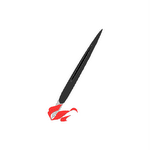Happy Marine Corps Birthday!!!
Marines Get the News From an Iraqi Host: Rumsfeld’s Out. ‘Who’s Rumsfeld?’
ZAGARIT, Iraq, Nov. 9 — Hashim al-Menti smiled wanly at the marine sergeant beside him on his couch. The sergeant had appeared in the darkness on Wednesday night, knocking on the door of Mr. Menti’s home.
When Mr. Menti answered, a squad of infantrymen swiftly moved in, making him an involuntary host.
Since then marines had been on his roof with rifles, watching roads where insurgents often planted bombs.
Mr. Menti had passed the time watching television. Now he had news. He spoke in broken English. “Rumsfeld is gone,” he told the sergeant, Michael A. McKinnon.
“Democracy,” he added, and made a thumbs-up sign. “Good.”
The marines had been on a continuous foot patrol for several days, hunting for insurgents. They were lost in the hard and isolating rhythms of infantry life.
They knew nothing of the week’s news.
Now they were being told by an Iraqi whose house they occupied that Defense Secretary Donald H. Rumsfeld, one of the principal architects of the policies that had them here, had resigned. “Rumsfeld is gone?” the sergeant asked. “Really?”
Mr. Menti nodded. “This is better for Iraq,” he said. “Iraqi people say thank you.”
The sergeant went upstairs to tell his marines, just as he had informed them the day before that the Republican Party had lost control of the House of Representatives and that Congress was in the midst of sweeping change. Mr. Menti had told them that, too.
“Rumsfeld’s out,” he said to five marines sprawled with rifles on the cold floor.
Lance Cpl. James L. Davis Jr. looked up from his cigarette. “Who’s Rumsfeld?” he asked.
If history is any guide, many of the young men who endure the severest hardships and assume the greatest risks in the war in Iraq will become interested in politics and politicians later, when they are older and look back on their combat tours.
But not yet. Marine infantry units have traditionally been nonpolitical, to the point of stubbornly embracing a peculiar detachment from policy currents at home. It is a pillar of the corps’ martial culture: those with the most at stake are among the least involved in the decisions that send them where they go.
Mr. Rumsfeld may have become one of the war’s most polarizing figures at home. But among these young marines slogging through the war in Anbar Province, he appeared to mean almost nothing. If he was another casualty, they had seen worse.
“Rumsfeld is the secretary of defense,” Sergeant McKinnon said, answering Lance Corporal Davis’s question.
Lance Corporal Davis simply cursed.
It did not sound like anger or disgust. It seemed instead to be an exclamation about the irrelevance of the news. The sergeant might as well have told the squad of yesterday’s weather.
Another marine, Lance Cpl. Patrick S. Maguire, said the decisions that mattered here, inside Company F, Second Battalion, Eighth Marines, were much more important to them than those made in the Pentagon back home.
There are daily, dangerous questions: When to go on patrol, when to come back, which route to take down a road, which weapon to carry, and, at this moment, which watch each marine would stand, crouched up on the roof, in the cold wind, exposed to sniper fire.
His grandfather fought at Iwo Jima, he said, and his father was a marine in Vietnam. This was his second tour in Iraq. “Here’s the deal,” he said. “Someone points a finger at you, and you go.”
“The chain of command?” he added. “You know how high I know? My battalion commander is Lt. Col. DeTreux. That’s how high I know.”
And so between the marines and Mr. Menti and his family, the split reactions to news of Mr. Rumsfeld’s resignation made for surreal scenes.
Mr. Menti, 50, a radiologist by training, spent part of the afternoon trying to impress the meaning of the news on the young sergeant beside him on the couch.
The war policy was soon to change, he said.
“I think in one year you return to America,” he said.
The sergeant sat implacably.
“This is good for you,” Mr. Menti said. “No?”
He spoke of years of fear. Under Saddam Hussein, he said, they were afraid. Now, with the American troops and insurgents fighting in Anbar, they are still afraid. He returned to the news of Mr. Rumsfeld’s resignation.
“People in America are very happy,” he said. “I saw this on TV. And I am very happy. Thank you, American people.”
He pointed at the young marines before him, smoking on his couches, drinking his hot, sweetened tea. “These soldiers, in Iraq, they make freedom?” he asked.
“Yes,” Sergeant McKinnon said.
“What kind of freedom?” he asked.
He had been talking about the living conditions in the province since the night before, when the marines appeared at his door.
There are almost no schools, he said. There is almost no medicine. There is little food, and no electricity except from generators. The list went on. No water. No work. Violence. Abductions. Beheadings. Explosions.
His son-in-law had been kidnapped by insurgents seven months ago, he said, and a note the insurgents left said he was abducted for being friendly with American troops. He has not been seen since.
In Baghdad, he said, Iranian-backed death squads were killing Sunni citizens. The country was falling apart.
“You like freedom?” he asked the sergeant. “This kind? This way?”
“No,” Sergeant McKinnon said.
“I think you and I and many people do not like freedom in this way,” he said. “I believe this. I am sure.”
“It is wrong, the American Army coming here. It is wrong.”
He looked at Sergeant McKinnon, who is younger than many of his 14 children. He was trying to draw him out.
“If American Army came here for three months, four months, O.K.” Mr. Menti said. “But now is four years.”
If there were no American military presence in Iraq, he said, there would be no insurgents. One serves as a magnet for the other.
Mr. Menti spoke to the sergeant as if he were an American diplomat, as if he had some influence over the broad sweeps of American foreign policy. The sergeant remained quiet and polite.
“I don’t think he realizes that we’re trying to make this country safer for him,” he said to Lance Corporal Maguire.
“I think he realizes that we’re trying to make it safe, but that the more we stay here the more people come in and make it worse,” Lance Corporal Maguire replied.
They went upstairs, to pack their gear for the next move, planned for after dark, to another house and another night of looking down on the roads, waiting for an insurgent with a bomb to step within range of a rifle shot.
Sergeant McKinnon spoke of the squad’s isolation. “I only found out yesterday that the Saddam trial was over,” he said. “Another Iraqi told me that.”
He turned to the task of planning for the night’s fire support.
Up on the roof, Lance Corporal Maguire mused about the news. Whatever Mr. Rumsfeld’s resignation might eventually mean, it did not matter here yet, and it would not keep them alive tonight.
Another marine, Lance Cpl. Randall D. Webb, was scanning traffic through his rifle scope, worried that they had been spotted and the insurgents would soon know where they were.
“I think they see us,” he said.
“Man, they all see us,” Lance Corporal Maguire said, and lighted another cigarette.
Copyright 2006 The New York Times Company





No comments:
Post a Comment